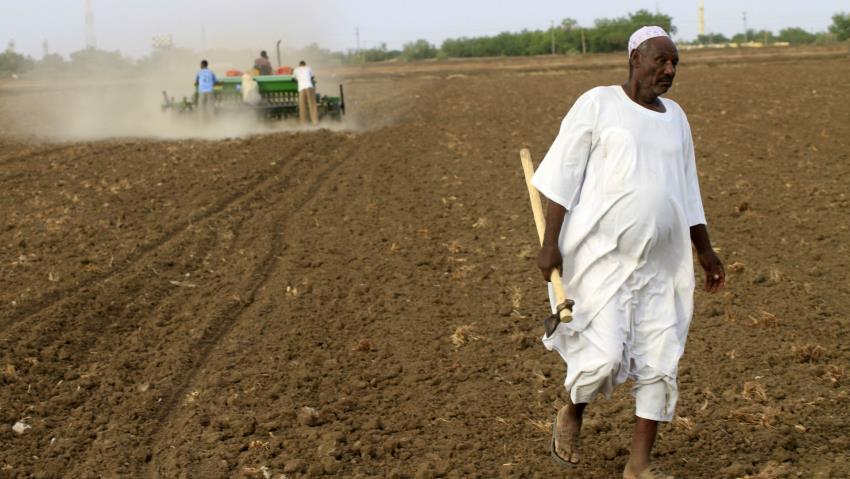Sudan war: Arab League warns of impact on food security in the region

Farmers in Sudan (File photo)
CAIRO / BAKU / ADDIS ABABA –
Ahmed Aboul Gheit, Secretary-General of the League of Arab States, on Thursday warned of the impact of the ongoing war in Sudan on the food security in the country and the Arab region. The Sudanese government welcomes the IGAD initiative to resolve the armed conflict between the Sudan Armed Forces (SAF) and the paramilitary Rapid Support Forces (RSF).
The fighting that broke out in Sudan on April 15, has led to the disruption of agricultural projects, the cessation of the transport of and the destruction of large quantities of goods, and soaring prices, he said, following a briefing by Ibrahim El Dukheiri, Director General of the Arab Organization for Agricultural Development (AOAD) in Cairo.
The AOAD, based in El Amarat in Khartoum, is a sub-regional organisation under the Arab League that focuses on food security and agricultural development in the 22 Arab countries.
El Dukheiri briefed the secretary-general on the latest developments in Sudan and the situation of the agricultural sector in the country.
Aboul Gheit responded by saying that “These dangerous conditions require rapid action at Arab and international levels.”
They also discussed the broad outlines of a plan developed by AOAD in cooperation with the General Secretariat of the League of Arab States and aims to secure trade and supply chains for grains and food products.
In early May, Arab FA ministers decided to form a ministerial committee of Saudi Arabian and Egyptian foreign ministers and the League’s secretary-general with the aim to reach a sustainable ceasefire between the warring parties, the Arab League reported.
The Arab League at the time stressed the necessity to fully respect Sudan’s sovereignty and territorial integrity and reaffirmed its intention not to interfere in Sudan’s internal affairs.
‘These dangerous conditions require rapid action at Arab and international levels.’ – Ahmed Aboul Gheit, Secretary-General of the Arab League
Earlier this week, politician Siddig El Sadig El Mahdi warned of the economic impact of the fighting. He said that the daily military spending amounts to half a billion dollars per day whilst the number of Sudanese in need of food aid has nearly doubled.
The Famine Early Warning Systems Network (FEWS NET) expects that the number of people in Sudan in need of humanitarian food assistance will be one of the highest in the world by the end of the year.
IGAD
On Thursday, the head of the African Union Commission, Moussa Faki, discussed the situation in Sudan with Workneh Gebeyeh, Executive Secretary of the Horn of Africa’s Intergovernmental Authority on Development (IGAD)
The two sides agreed to coordinate efforts aimed at a ceasefire and cessation of hostilities in Sudan while returning to political negotiations.
The Sudanese Foreign Affairs Minister said on Thursday that the government welcomes the IGAD initiative to resolve the war between the Sudan Armed Forces (SAF) and the paramilitary Rapid Support Forces (RSF) that broke out on April 15.
Acting FA Minister Ali El Sadig told his Ugandan counterpart, Gen JeJe Odongo, on the sidelines of the ministerial meeting of the Non-Aligned Movement in the Azerbaijani capital Baku, that the Sudanese government welcomes the IGAD initiative, “provided it happens in consultation with the Sudanese government”.
‘Nairobi is guided by international initiatives in dealing with Sudanese affairs, which does not serve the principle of African solutions to African problems.’ – Acting FA Minister Ali El Sadig
El Sadig reiterated the Sudanese government’s objection to Kenya’s chairmanship of the IGAD Quartet, formed during the IGAD summit in Djibouti on June 12 to search for a solution to the Sudanese crisis. The IGAD Quartet consist of Kenya and South Sudan which are co-chairing the team, and members Ethiopia and Djibouti.
He said that Nairobi is guided by international initiatives in dealing with Sudanese affairs, “which does not serve the principle of African solutions to African problems”.
President of Sudan’s Sovereignty Council and SAF Commander-in-Chief Gen Abdelfattah El Burhan earlier informed IGAD Chair Ismail Guelle about his stance concerning the Kenyan chairmanship. “Kenya is not neutral and is home to RSF rebel leaders.”
In end June, El Burhan told the Turkish President Recep Erdoğan that he accepts Turkey as a mediator in the conflict.
The “secrecy” of the joint US-Saudi mediation team in Jeddah has been criticised by various analysts.
“They are evidently more concerned with having full ownership of the process rather than its actual success [..],” Sudanese politician Amgad Fareid El Tayeb stated in early May.











 and then
and then